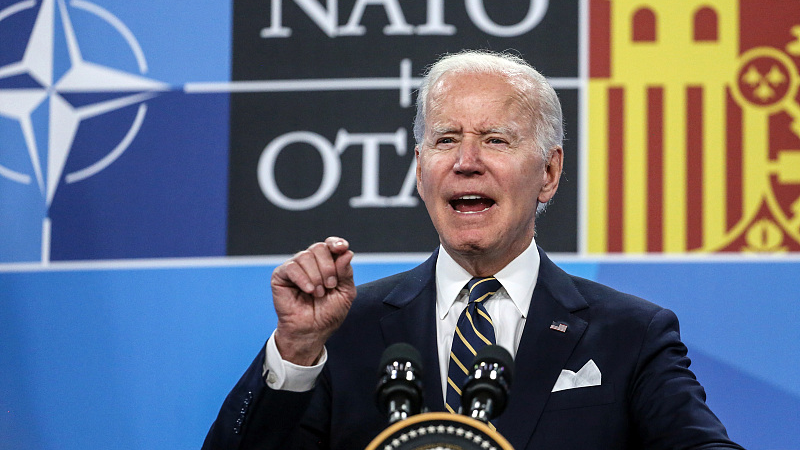
U.S. president Joe Biden during a news conference following the final day of the North Atlantic Treaty Organization (NATO) summit at the Ifema Congress Center in Madrid, Spain, June 30, 2022. /CFP
U.S. president Joe Biden during a news conference following the final day of the North Atlantic Treaty Organization (NATO) summit at the Ifema Congress Center in Madrid, Spain, June 30, 2022. /CFP
Editor's note: Hamzah Rifaat Hussain, a former visiting fellow at the Stimson Center in Washington and former assistant researcher at the Islamabad Policy Research Institute, is a TV anchor at Indus News in Pakistan. The article reflects the author's opinions and not necessarily those of CGTN.
The Biden administration has approved $1.1 billion in arms sales to China's Taiwan region which include providing offensive weapon systems such as anti-ship and air-to-air missiles. The weapon systems being provided constitutes yet another provocation which will further undermine strategic stability and jeopardize peace in the region.
The push by Washington to arm Taiwan region with billions of dollars of weapons continues unabated in 2022. The Biden administration formally notified Congress of the proposed $1.1 billion worth of arms sales to Taiwan region which include close to sixty anti-ship missiles and a hundred air-to-air missiles. Such authorization once again reveals America's obsession with regional provocations given the offensive orientation of the weapons package being provided.
Contrary to rationales cited to arm Taiwan region, such measures undermine instead of reinforcing regional peace. As per the U.S. State Department, the swift sale of such arms is essential to its security and are in line with the American policy on Taiwan region. Defense analysts however, would beg to differ. Note that the package announced includes Sidewinder missiles, which can be used for air-to-air and surface attack missions, Harpoon anti-ship missiles and support to the Taiwan regional radar system worth an estimated $665.4 million as per the Pentagon's Defense Security Cooperation Agency (DSCA). Hence, the Pentagon cannot claim that equipment being provided to Taiwan region will not alter the basic military balance in the region. It would actually upset the military balance instead.
The U.S. State Department further says that arms sales are consistent with the "Taiwan Relations Act," allowing Taiwan to benefit from defensive articles and services to maintain minimum credible deterrence. However, weapons being provided have an offensive character and cannot be defined as routine proposals or cases as Washington describes them as. Neither can such authorizations support a peaceful resolution of cross-Strait relations as mentioned by the State Department. In essence, such authorization arms the separatist leadership of Tsai Ing-wen and emboldens Taiwan region to conduct offensive operations with the aim of rejecting peaceful reunification with Chinese mainland. This is a clear threat to regional peace.

Tsai Ing-wen attended the 127th anniversary of the Anti-Japanese War, Taiwan, July 2, 2022. /CFP
Tsai Ing-wen attended the 127th anniversary of the Anti-Japanese War, Taiwan, July 2, 2022. /CFP
These arms sales also have a political orientation. Note further that in August, the Pentagon created a taskforce of officials to examine lingering inefficiencies in the U.S. sales of weaponry to foreign states. The "Tiger Team" was established to devise strategies for the Defense Department to streamline arms sales with the objective of providing American drones, tanks and helicopters to different countries faster than expected. This task force has been spurred by the Ukraine conflictand the Pentagon speeding up arms sales to Taiwan region to counter the Chinese mainland, is indicative of a regressive, competitive and rogue approach.
On the other hand, China has called for upholding freedom of navigation, demilitarization and resolving disputes in an amicable manner as mentioned by Chinese State Councilor and Foreign Minister Wang Yi at the international symposium commemorating the 40th anniversary of the signature of the United Nations Convention on the Law of the Sea (UNCLOS).
It is clear that the entire U.S. policy on Taiwan region has been flawed from the outset, with provocative visits of government officials, senators and lawmakers only undermining peace and stability. As a result, further authorization of arms sales to Taiwan region exacerbates regional tensions. In terms of arms exports, the U.S. already accounted for 39 percent of the global share as per the Stockholm International Peace Research Institute 2022 report and arming secessionists with offensive weapons further damages its credentials as a promoter of peace or securer of freedom of navigation. Washington has also chosen to overlook how the Tsai Ing-wen leadership has pushed for an increase of 12.9 percent in Taiwan regional annual budget for 2023 which boosts defense spending by $1.6 billion.
Ignoring such realities also damages bilateral relations as mentioned by spokesman for the Chinese embassy in Washington, Liu Pengyu, who considered such moves to send wrong signals to separatist forces in Taiwan region. It is clear that ruptures in the U.S.-China relationship are solely due to American policies of arming and weaponizing Taiwan region to counter the Chinese mainland.
There is hence little merit to the Biden administration's arms sales authorizations to Taiwan region as they continues to jeopardize peace and stability in the region.
(If you want to contribute and have specific expertise, please contact us at opinions@cgtn.com. Follow @thouse_opinions on Twitter to discover the latest commentaries in the CGTN Opinion Section.)

